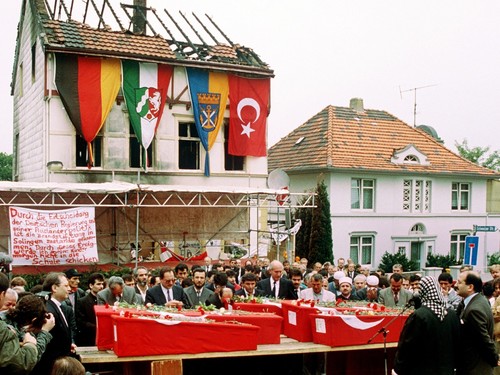Discrimination and xenophobia against Turks still continues in Germany as the 25th anniversary of the Solingen tragedy, during which five Turkish nationals were killed and a dozen others were injured in a racist arson attack, is being commemorated in several events. On May 29, 1993, four people between the ages of 16 and 23 set the house of the Genç family ablaze in the German city of Solingen in North Rhine-Westphalia, killing five people and injuring 14 others. Three assailants were sentenced to 10 years in jail, while the other convict was handed 15 years imprisonment. "[The Solingen arson attack] was an attack against all of us, against our values and peaceful coexistence," German Foreign Minister Heiko Maas told the Funke media group yesterday.
Maas called for stronger efforts against xenophobia and discrimination on the anniversary the attack, saying that it is a shame that Turks who have been in Germany for generations still experience discrimination in their daily lives. Turkish Foreign Minister Mevlüt Çavuşoğlu also attended the commemoration events in Solingen. "Twenty-five years have passed since 5 #Turkish citizens were murdered by a racist arson attack in #Solingen #Germany. Our pain is still fresh after a quarter of a century. We are concerned by the rise of crimes against humanity in Europe such as #racism and #islamophobia," Çavuşoğlu wrote on his Twitter account yesterday.

The photograph from June 3, 1993 in Solingen, Germany shows the coffins of five Turkish women in front of the burned-out house where they died in an arson attack on the night of May 29, 1993.
Seventy-five year old Mevlüde Genç, who lost two daughters, two granddaughters and a niece in the attack, met with German President Frank-Walter Steinmeier last Friday. Following the meeting, Steinmeier stated that he sees Genç "as a role model for everyone who fights against discrimination, racism and violence," while calling for the memory of the violent attack to not be forgotten. Genç is known for her calling for reconciliation despite the brutality of the attacks and thus was given the country's highest civilian honor, the Federal Cross of Merit on Ribbon, in 1996.
Visiting the house of the Genç family in Dusseldorf as part of the commemoration event that took place in the presidential building of the North Rhine-Westphalia attended by Foreign Minister Mevlüt Çavuşoğlu, German Chancellor Angela Merkel expressed her sadness regarding the attack.
"The catastrophe that took place is an embarrassment to our country," said Merkel.
Çavuşoğlu also said Germany and Turkey should act together on integration policies for the sake of Turks in Germany.
"The only expectation of these people, whose second homeland is now Germany, is to be equal citizens and individuals in this society," Çavuşoğlu expressed while emphasizing the importance of standing together against racism.
The Foreign Ministry also issued a statement Monday in remembrance of the victims of the attack, saying that, "We hope these kinds of tragedies will not happen again; however, we are concerned that racism, xenophobia and Islamophobia are on the rise despite the fact that a quarter of a century has passed since the Solingen tragedy."
The 3 million Turks in Germany, largely descended from the country's "guest workers" who arrived to aid the post-World War II development boom, often complain of the racist attacks and the lack of follow-up in police investigations for such incidents.
Dozens of xenophobic attacks occurred between 1990 and 1996 amid growing resentment against foreigners in the country after the unification of East and West Germany in 1990 and claimed the lives of at least 18 immigrants and asylum seekers and injured dozens more. The attacks against Turks started with the killing of 19-year-old student Mete Ekşi by three Nazi German brothers in 1991 in Kreuzberg. The killing of Ekşi was followed by other attacks, such as the one that killed Mustafa Demiral, 56, in 1993 in Mülheim. Though they are mostly nonlethal, arson attacks were one of the main methods of the attackers since they occasionally claim lives, like the Solingen attacks and another arson attack in 1992 in the town of Mölln that killed three Turks.
All these attacks have caused outrage in both Germany and Turkey and inspired many demonstrations that gathered thousands of people together of both Turkish and German descent.
Yet, these demonstrations were not enough to stop the attacks since the killing of Turks continued in into the 2000s, as well. Many Turkish shopkeepers were attacked in several German cities in the early 2000s, incidences that later became known as the "Döner murders," causing the deaths of eight Turks and one Greek. In 2011, it was revealed that the neo-Nazi group, the National Socialist Underground (NSU), was responsible for the attacks as well as for the Cologne bombing in 2004 that injured 22 Turks.
Since then, attacks have been sporadic but frequent enough to raise concerns among the Turkish community as far-right groups have gone mainstream in the past few years, accompanied by anti-Turkish discourse among far-right politicians. These attacks have led to tense relations between Turkey and Germany, as numerous Turkish citizens living in Germany and mosques became the targets of far-right attacks. Last year, Ankara warned citizens to be cautious and act responsibly when confronted with cases of xenophobia, incidents of racism and verbal attacks.